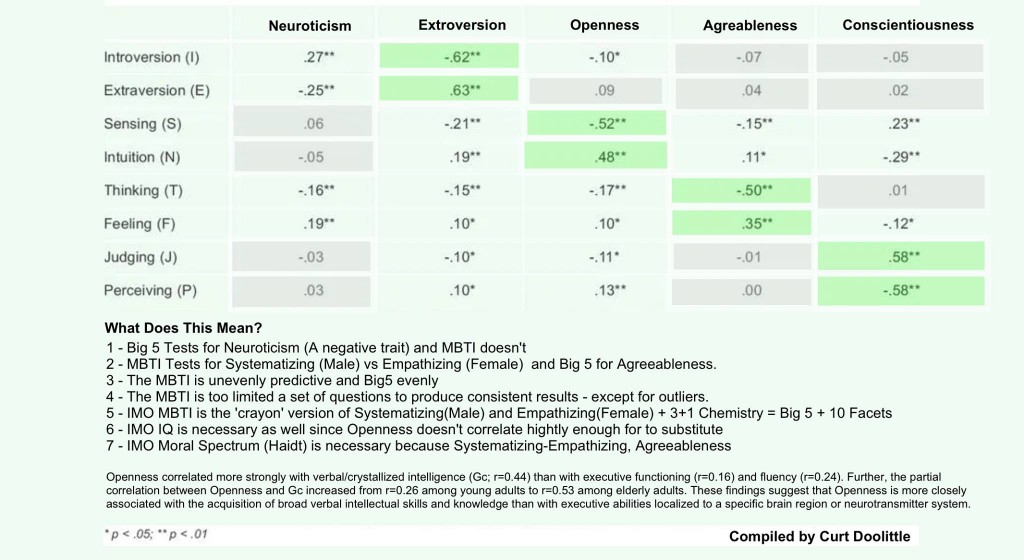
MBTI vs BIG5: I put this together tonight since it came up with Brandon.
What it means is that between the two competing top down (jungian), outward in (big5), and bottom up (biology) that we have correctly triangulated the hierarchy of human behaviors.
It tells us that in it’s search for sex-neturality and ‘positivity’, Big 5 failed to provide the insight of systematizing vs empathizing (men did it) and by not attempting to do so the Jungians (the women did it) correctly identified the primary causal difference.
Next it says both failed by not including intelligence, and specifically not separating ability vs accumulated knowledge, and that accumulated knowledge is the result of openness not ability.
Next it doesn’t account for Agency (and while I suspect conscientiousness is a requirement I think system thinking and dominance are a requirement as well and I don’t know how to test it.)
Next it doesn’t account for moral biases which haidt must have about right since it maps to all known forms of property.
Lastly it says that HEROISM and Mindfulness is not accounted for as is neuroticism. Since neuroticism is low on both scales. This is another … side effect of the ‘bias’ of Freudian, feminine, therapeutic rather than relying on full accounting in explanatory science.
So I will update my Blue Diagram to include the following
1 – Add brain’s sex structure (systematizing vs empathizing)
2 – Add T-dominance with O-Empathy – reinforcement.
3 – Add IQ with Ability (Fluid) and Acquired (Crystallized)
4 – Add Moral Biases
5 – Add Three weapons of influence bias, which reflect moral biases
6 – Add resulting three specialist classes (Trifunctionalism) that result from three weapons of influence.
And then we have the full explanation of psychology from first cause (Sex, brain structure, chemistry, expression).
And we can explain the variation in human psychology as a division of cognitive labor.
And we can then tie this range of adaptability to our genetic structure which appears to contain more information regulating gene expression than gene expression.
And we can then explain why man has survived by extraordinary adaptation.
And we can then explain why the success of the western model of trifunctionalism.
On Neuroticism (Threat Perception – Not in MBTI)
Characteristics associated with neuroticism include anxiety, hostility, anger, depression, self-consciousness, and stress vulnerability.
Neuroticism has its benefits—such as intelligence, humor, more realistic if “cynical” expectations, greater self-awareness, drivenness and conscientiousness, lower risk-taking, and a strong need to provide for others—it is also associated with self-criticism, sensitivity to others and social anxiety, moodiness and anxiety, poorer general health, greater day-to-day strain, and strong negative emotional reactions. As a result, neurotic people on average tend to find romantic, personal, and family relationships more effortful and less successful than desired, have problems keeping jobs, and generally aren’t as satisfied with life.
Neuroticism drives demand for mindfulness.
—“Can you develop a questionnaire to capture a lot of that and an analysis methodology”—Gary Knight
Someone can, because most of the tests already exist.
Your moral foundations test
Your big 5 Test
Your IQ Test (both aspects)
Your sex
Your maternal lineage’s religion for six generations
Your paternal occupational history for six generations
Your ethnicity for six generations.
I’d have to work on agency/non and heroism/victim. I don’t think it’s deducible from what we have. Might be. Dunno. Didn’t research it yet. (Sure someone has tried something similar, but negative postwar bias for supremacy or competitive excellence suppressed it pretty thoroughly. Pre-war it’s dominant. Post war it’s gone.